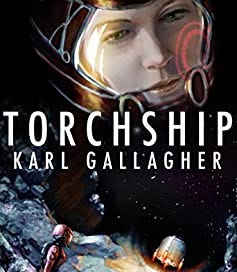
Imagine, if you will, if the TV show Firefly was written by David Weber, before Honor Harrington became Game of Starships with 500 characters whose names you can't recall.
The story
Torchship is told as a series of anecdotes that serve to build the world. Over the course of each story, the five missions all build on each other. The opening deals with a bunch of tourists … which turns into a cat and mouse chase among asteroids, a shoot out, and some additional SCIENCE!
Events that take place during the first story lead to the next mission with Terraformers … called "Kitty Chow." Yes, really. Trust me, you won't see this coming.
"Kitty Chow" leads to several bits of business in the next arc of stories, with Pilgrims, the Treasure of the Sierra Madre …. IN SPACE … and then Hitchhikers. How do you have hitchhikers in space? Heh heh heh.
The characters
The characters here are difficult to describe, for the simple reason that much of who they are is expressed during the story and as part of events. Imagine starting with a a collection of characters who seem to be a handful of cliches, and every last one of them has a surprise inside. To steal from one TV show, on this ship, no one is who they appears to be.
The world
There are several interludes that take place in between the missions of the torchship in question, and they both add to the narrative and provide some exposition. This is important, since there is little in the way of exposition in the stories. There is just enough data here to get you through the story, but nothing else. "The Fusion worlds" are paranoid about technology, because the AIs revolted. Why did the AI revolt? No idea. We don't need to know. We just need to know that they dislike humans. Don't worry, they'll explain.
But dang, this was fun. Granted, we don't have the scene-chewing, over the top characters from Firefly, but we also don't have their angsty BS. The crew of the Fives Full are … generally well-adjusted individuals. The story doesn't leave you wanting, but it does leave you with a desire to know more about the world, and what happens next to our heroes.
On the one hand, I would say that this is hard SF -- our heroes plot courses with slide rules, we have terraforming (right now, it's mostly done by Israel), AIs, genetic engineering and using elements for fuel. I think the only thing that isn't merely an extension of current technology is translating through space via various and sundry portals. But this man has planets listed with their gravity well intensity. Who does that? Answer: an MIT grad with an engineering degree.
Yes, Karl is a rocket scientist.
However, to say that this is hard SF would be terribly mislabeling it. Much of hard SF is so techy, you'd be hard pressed to find character or culture among the people and places. Here? Here, there is something for everybody. There are multiple systems of government, from an auctionocracy (yes, they auction off seats, it's half the tax income for the year) to representative government, et al. The cultures are clear, and unique, and varied all over the place. It's a wonderful array of stuff here, and it's obvious that Karl has put in plenty of time contemplating … everything.
The politics
Not only is this libertarian to conservative, it is so in multiple ways. How many different types of small government can you have in a world? I think Karl's still adding to the pile. `
But overall, our heroes are basically small businessmen trying to make out a living. All the way, they're solving problems that big government just can't, or won't, solve. In some cases, it's because big government is the sole cause of the problems --sometimes deliberately. But this is a group of ordinary people doing the best they can with what they have, and coming up with extraordinary heroism as a result.
Content warning
There's some sex. It's not graphic; it's mentioned off-screen.
Who is it for?
Torchship is recommended for readers who enjoy David Weber or Timothy Zahn. This really feels like if Firefly had been done really well, and if Honor Harrington were made into three books instead of 40.
Why read it?
One problem I have with this particular novel: why are they broken up into short stories instead of chapters? It reads continuously. Also, the opening few pages (less than five) are disorienting. They do feed into the story, and any confusion from the opening is resolved by the end, so no worries there. It may make it a little difficult for some people to get into the novel initially. Don't worry about it, just push through the first five page (okay, more like page 5, 6, and 7) and you're good.
Is it Superversive? Hell yes. That's the easy part. Is it Pulpy? Well, that's according. You see, there's a romance going on here, a spy story, a thought problem story, with multiple types of adversaries -- the ever present man versus nature of hard vacuum, man versus man, man versus self, and man versus society.
Overall, it's just awesome. It's fun. Read it. Enjoy.















